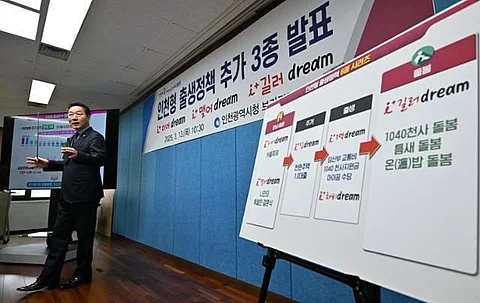

As South Korea continues to grapple with plummeting birthrates and fears of regional depopulation, local governments are now expanding their efforts beyond childbirth subsidies to include cash incentives for marriage, covering everything from first dates to engagement and honeymoon expenses.
While the urgency is clear, critics argue that these one-off financial incentives may do little to address the structural challenges behind delayed or declining marriage rates, The Korea Times reported.
In Busan, local authorities have promised up to 20 million won (Rs 12.5 lakh) in payments to couples who marry after participating in a matchmaking event organized by the authorities.
Additional benefits include 5,00,000 won for dating expenses, 1 million won for engagement meeting costs and a 10 million won travel subsidy.
“This is one component of our population policy to counter the crisis of low birthrates and regional decline,” a district official said, adding that no couples have received the full payment yet.
Other municipalities across the country are rolling out similar initiatives. In South Gyeongsang Province’s Geochang County, newlyweds aged 19 to 45 who reside there for more than three months receive 6,00,000 won annually for three years.
Hadong county recently raised its marriage incentive from 5 million to 6 million won. Several other counties and cities are offering between 1 million and 2 million won in marriage subsidies.
The trend isn’t limited to rural areas. Seoul, which had the lowest fertility rate among Korea’s 17 major cities and provinces last year, plans to introduce a one-time 1 million won "marriage starter fund" for newly registered couples starting in October.
Gyeonggi province will offer a similar amount to young couples aged 19 to 39 beginning next month.
In some regions, marriage incentives are even more generous. Sunchang county in North Jeolla Province offers 10 million won in local currency over four years to newlyweds who reside there for at least one year.
The cities of Gimje and Jangsu county have maintained similar programmes since 2020 and 2018, respectively. Hwasun county and Yeongdong county also distribute 10 million won in installments over five years.
Despite the growing number of programmes, their effectiveness remains uncertain. Jinju City in South Gyeongsang province has distributed 5,00,000 won in marriage grants to over 4,000 couples since 2021, but overall marriage rates have not significantly changed.
In Jangsu county, where the 10 million won incentive has been in place for eight years, marriage rates have declined except for a temporary bump in 2023 and 2024.
“Would anyone really get married just to receive a congratulatory payment?” said one local government official. “Still, doing something is better than doing nothing.”
Experts said that these marriage incentives may repeat the mistakes of past childbirth subsidies, which failed to reverse declining birth rates despite years of spending on baby bonuses, child-rearing stipends and childcare vouchers.
“Policies should focus on creating an environment where work and family can coexist, and where housing burdens are eased,” said Hong Suk-chul, an economics professor at Seoul National University. “Current cash-based incentives, driven by local competition and rushed implementation, are distorting the policy landscape and need to be restructured.”